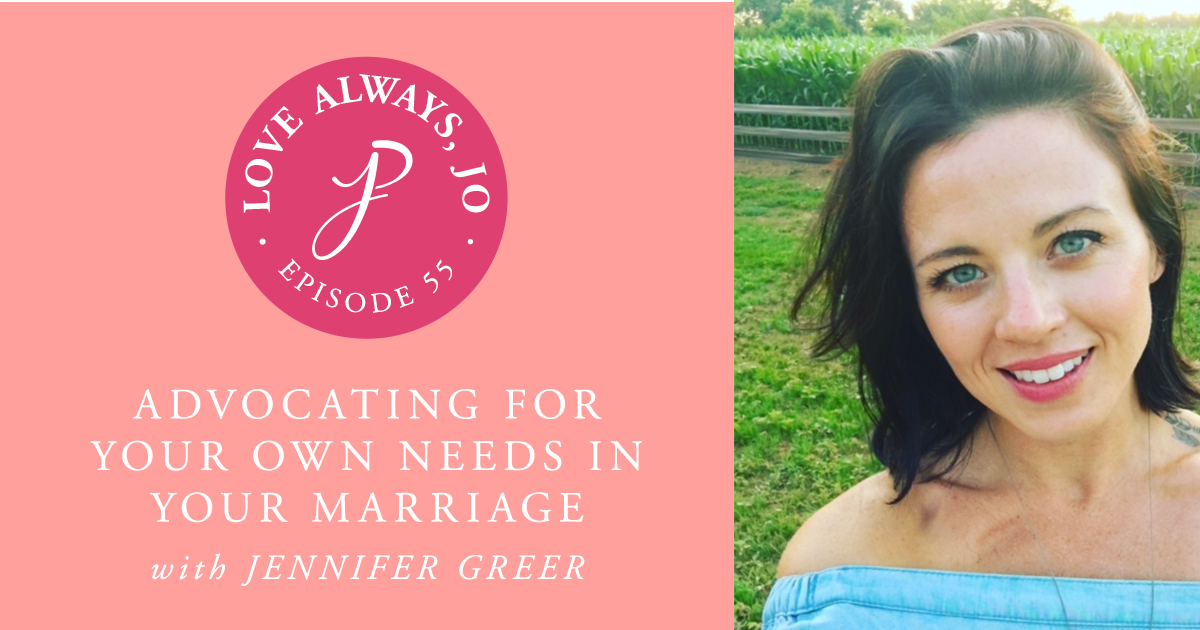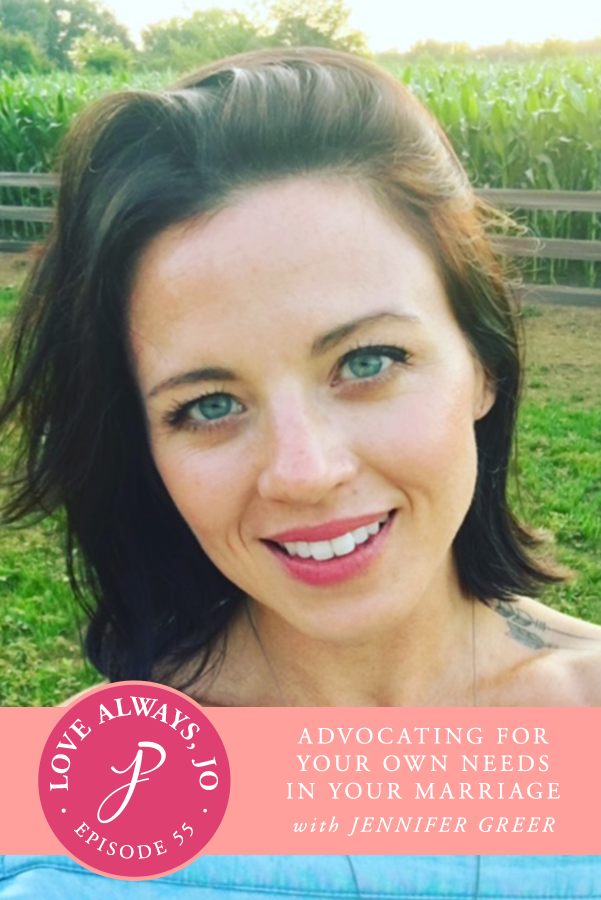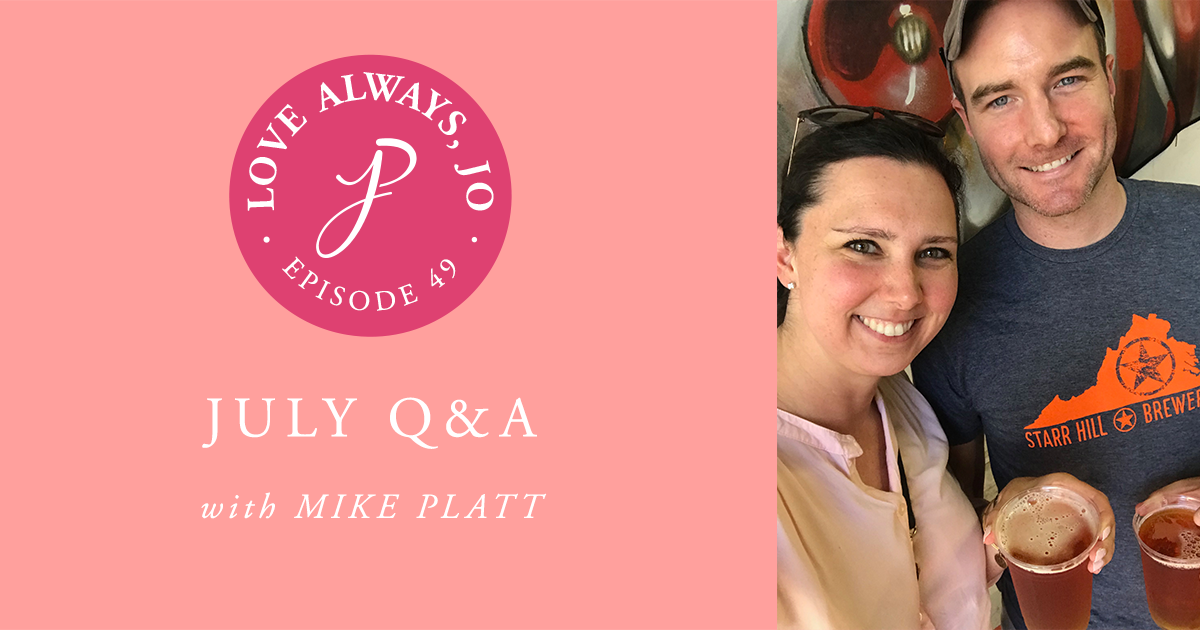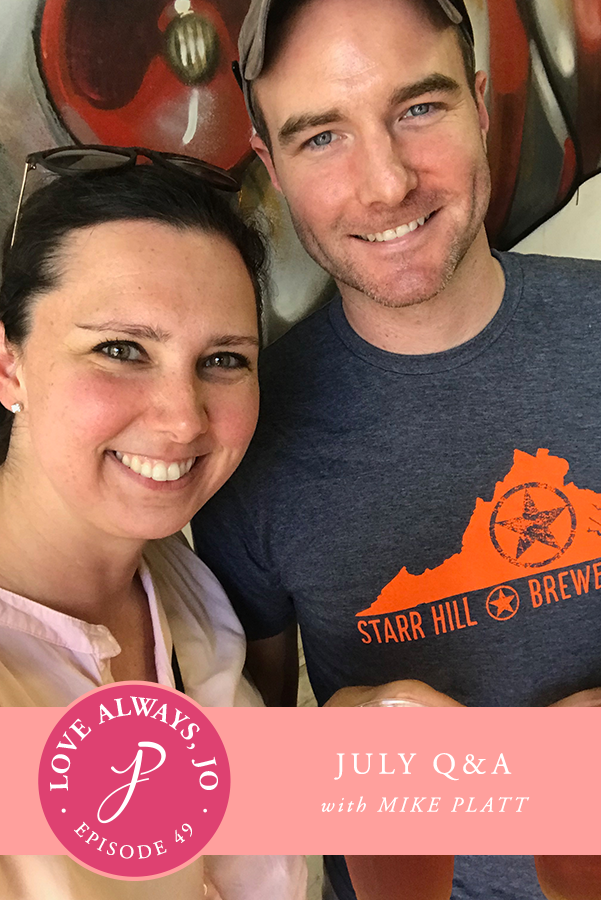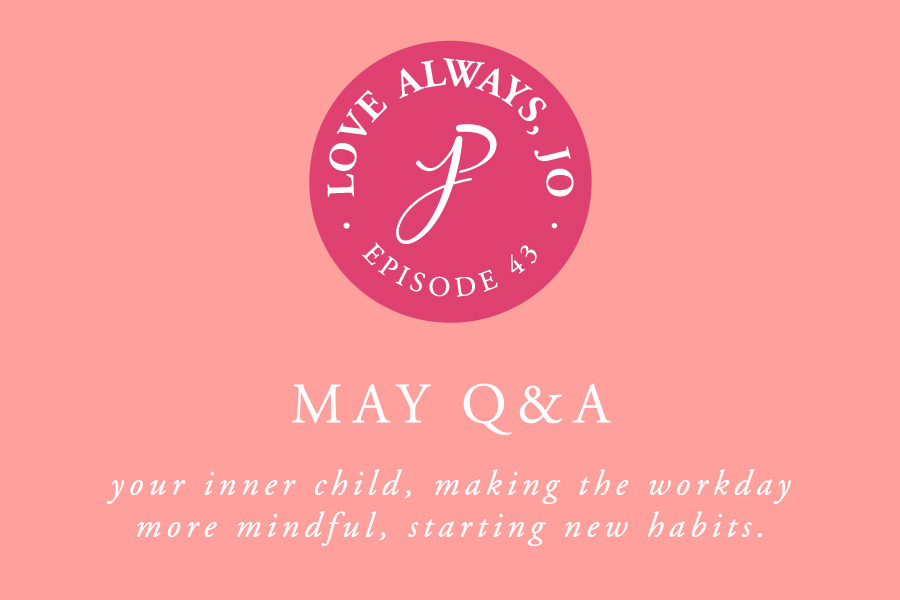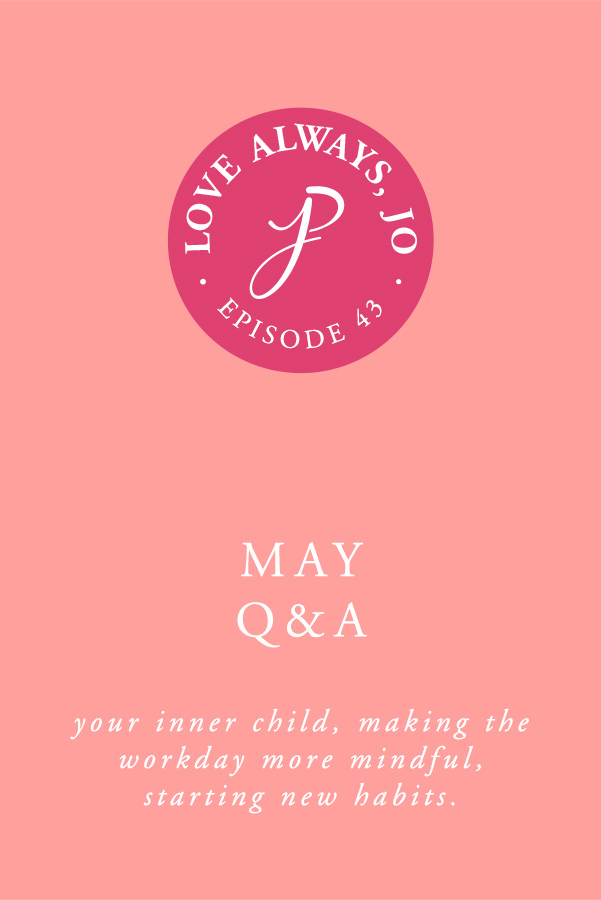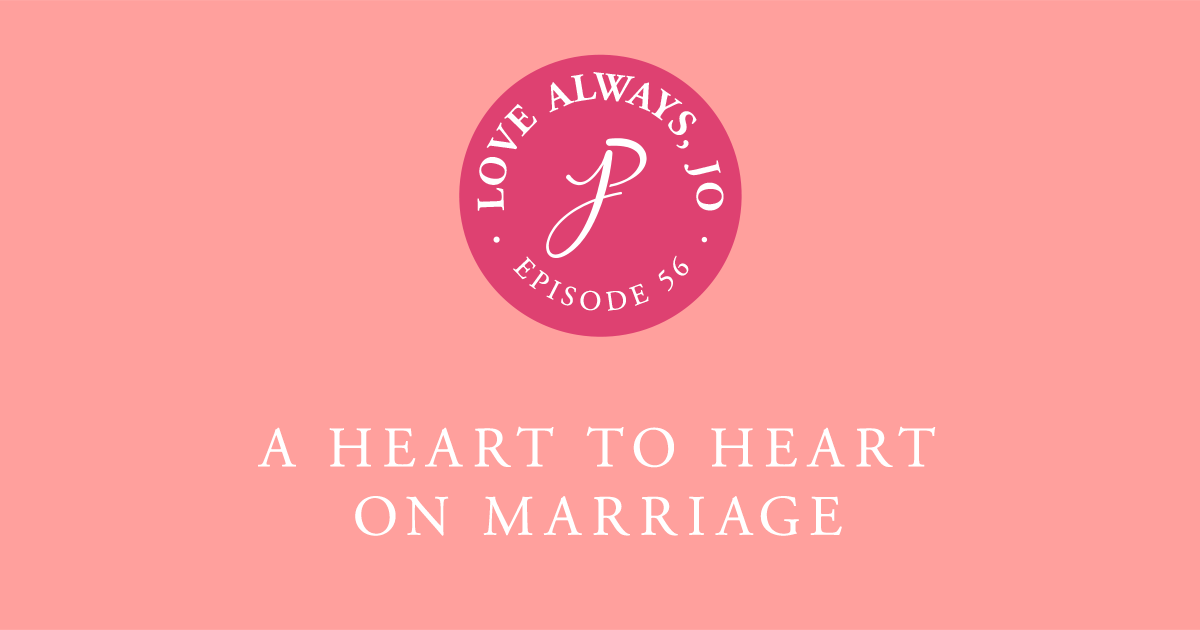
This month’s heart to heart is on the topic of Marriage. In this episode of Love Always, Jo I’ll be answering questions about advice for newlyweds, finances, being single, and the perceptions of marrying young.
Journal Prompts:
- What are good things that are happening in your life?
- Who does your inner critic think you need to be now that you’re a wife?
- How can you enjoy this season you’re in right now?
- How can you love where you’re at in your life right now?
- If you loved your life what would change for you? How would you act differently, think differently, show up in your relationships?
Quotes:
- Marriage is not set it and forget it
- Monitor your connection
- Marriage takes effort, attention and intention
- Don’t put your marriage on autopilot
- You are still just as valuable and lovable as you’ve always been no matter what stage of life you’re in
- When you know, you know
- You don’t have to have all the answers
- Change is a good way to illuminate that patterns you’re in
What is your best advice for newlyweds?
When you ask someone how married life is going often they’ll say it’s the same and that nothing has changed. However, something does change, there is a subtle shift in your relationship. Often you’ll feel more deeply committed to your partner, with men in particular, they feel more responsible for you and need to provide for you in that way. Honor the change and identity shift and know its okay if you feel those deeper feelings that people don’t often talk about. Create space in your life to reflect on it.
Also, watch what your inner critic thinks about who you should be now that you’re married or who your partner should be ( i.e. you should be happy, newlywed phase or there are challenges you didn’t expect). Be careful with what you project on yourself and onto your partner.
The last thing is that marriage is not set it and forget it. Happily ever after is a thing, but you have to be intentional about it. Make sure you monitor your connection with your spouse. Marriage takes effort, attention and intention.
Should the amount of time I spend with friends change now that I’m married? Should I spend more time with my partner and less time with my friends?
If the amount you’re spending with friends works for you and your partner, go with that. If friendship is a high value of yours you need to continue to prioritize that. It’s great that you’re cognizant of your husbands needs, so if you aren’t sure, ask them and create the space for them to answer honestly. Give them time to answer because chances are they haven’t fully thought about that yet, so give them a couple days to process and get back to you.
Another thing to ask is, is your partner’s love language quality time? If it is then ask them what it looks like and how much quality time they actually need versus quantity time.
There’s also a chance that your inner critic is telling you that you need to spend less time with other and have less fun now that you’re a wife. My inner critic thinks I need to be a 1950’s wife, but my husband doesn’t even get home until 7:30, so a lot of those things my inner critic thinks I should be and do, isn’t grounded in reality. So you need to ask yourself, who does your inner critic think you need to be now that you’re a wife? What roles and expectations, are they true? Do you want to be that person? Does your spouse want you to be that person?
How to talk about money without tension (without the conversation going off the rails)?
This is a tough one. We still personally struggle with this, but we’ve gotten better at it. Money is about security, safety, survival, stability. And it’s about values and getting your needs met.
That means that your inner critic is right there at the front wanting to advocate for whatever you need, it’s not your true self but your protector. You can’t have a productive conversation from that place.
Tip 1: Watch how your fight or flight response kicks in during these conversations. Remind yourself that you are safe. Know it’s okay and normal for that response to happen. Even though we now have weekly money meetings, we still need to take breaks during the conversation because we still can get emotional or scared. There’s always more to learn and figure out about your money, yourself and your spouse. Give it time and know you may need to have multiple conversations about one topic.
Tip 2: Split your money conversations into 2 parts. In part one, talk about the heart stuff (what do you need, what do you want, etc.), then talk about the head stuff (nuts and bolts of the numbers — budgeting tool).
Tip 3: Use a budgeting tool. We use YNAB (You Need A Budget) to help use budget and manage our finances.
Note: I have a whole lesson on talking about money in my relationship course, Engaged. And, because so much of today’s conversation ties to things covered in that course, like money and inner critic in marriage, I’m giving you all $50 off of the course if you sign up before October 31, 2018. Use code lovealwaysjo at checkout. Go to joanna-platt.com/engaged to learn more.
These next two questions came in and I’ll answer them separately, but wanted to say that even though they seem so different, they’re both about fitting in and feeling left out or different. We all just want to belong and be confident about where we are in our lives. This is such a weird time in life. Until you graduate from college, everyone around you is at the exact same step. Navigating this time in your life is like balancing on a Bosu ball.
Can we talk about being the single at the dinner party? What about those of us in this shifting generation who always thought we’d be married in our 20s and are now adjusting to life as a party of 1 in a circle full of married friends.
Know that we love you and want you around. Regardless of what your relationship status is we love you and need you in our lives still. I love my single friends because it can be easier (or feels easier) to get quality time with them (quality time is my love language). You still add value to our lives. I love talking with my single friends, there’s a different pace of life and schedule.
Something similar actually came up for me recently. I found out that one of my friends is pregnant. A lot of my friends are starting families and we’re not. When I found out about it, I felt two emotions: like a failure and lonely. And happy for my friend, of course. I felt like a failure because I wasn’t doing what everyone else was doing. But I can’t make myself get there any sooner than I’m going to get there. I felt lonely because my friends were moving on to different steps and then they’ll be in different life phases then me and it made me think will they even want me or need me in their life anymore.
Here’s the thing. You are not a failure because you’re not married yet. Just like I’m not a failure because I haven’t started a family. And, we are still just as valuable and lovable as we’ve always been.
Ask yourself this question: How can you enjoy this season, knowing your person is out there somewhere and you will meet at the exact right time? How can you love where you’re at in your life right now? If you did love your life what would change for you? How would you act differently, think differently, show up in your relationships?
I think it would be interesting for you to share your perceptions on marriage culture in DC. I’m feeling like the odd one out for being married so young, whereas in the Midwest it wasn’t like that. And how people think marriage means sacrificing your individuality and potential advancement. I feel like I have to justify to others WHY I’m already married.
First things first — when you know, you know.
Secondly, watch your inner critic. Your inner critic probably wants you to do what everyone else is doing. I know mine does. That’s why me not having a baby after being married for so long has been very challenging for me emotionally. Remind your inner critic that it’s OK to get married “young”.
People in big cities tend to put marriage off longer than in other parts of the country. I think it’s because people in big cities are more focused on their careers and have more distractions. It’s just a different timeline, but that doesn’t mean that it’s right or wrong or that you’re not career focused if you get married young.
I also got married young. I got married when I was 25. Mike was 24! Being married has not made either of us sacrifice our individuality or potential advancement. He’s my biggest cheerleader and I’m his. Our marriage has been a space for us to grow and explore together and to bring our individual challenges and work through them. It’s a beautiful thing.
In last week’s episode, Jennifer Greer of Your Kickass Marriage said “Marriage and relationships should be spacious.” I completely agree. There should be space for both of you to learn and grow and reach your full potential.
Adjusting to change and not doing what you “should” do in marriage or home life
Mike recently changed his work hours to go until 6:30 every night. He doesn’t get home until 7:30. So we decided that we would do dinner separately during the week because I get hungry at like 4 and don’t sleep well when I eat later. This seems easy. But I got so sad and cried over this. Culture has been telling us that we need to eat together as a family in order to connect, so it’s been interesting navigating this change. It feels like standing on a Bosu ball trying to adjust to the new schedule. But looking back at how we used to do it I wouldn’t say it was necessarily working for us, but it was still an adjustment and change we had to work through.
Try it and see what happens, you don’t have to have all the answers. You can still have a very happy, connected, loving relationship even if you don’t have dinner together (or whatever your situation may be). What can you learn from this? What would happen if you got curious about this new normal? Even if you’re not the 1950’s housewife you’re still loveable and valuable.
Change is a good way to illuminate that patterns you’re in.
Two quick things before I let you go:
If you love this conversation and want to know more about my thoughts, advice, and guidance on marriage, I’ve put it all into my marriage course, Engaged. Get $50 off Engaged with the code lovealwaysjo when you sign up by October 31. Go to Joanna-platt.com/engaged to learn more.
Next month’s heart to heart topic will be on Doing It All. Send questions, thoughts, advice, or concerns on this topic to me here.
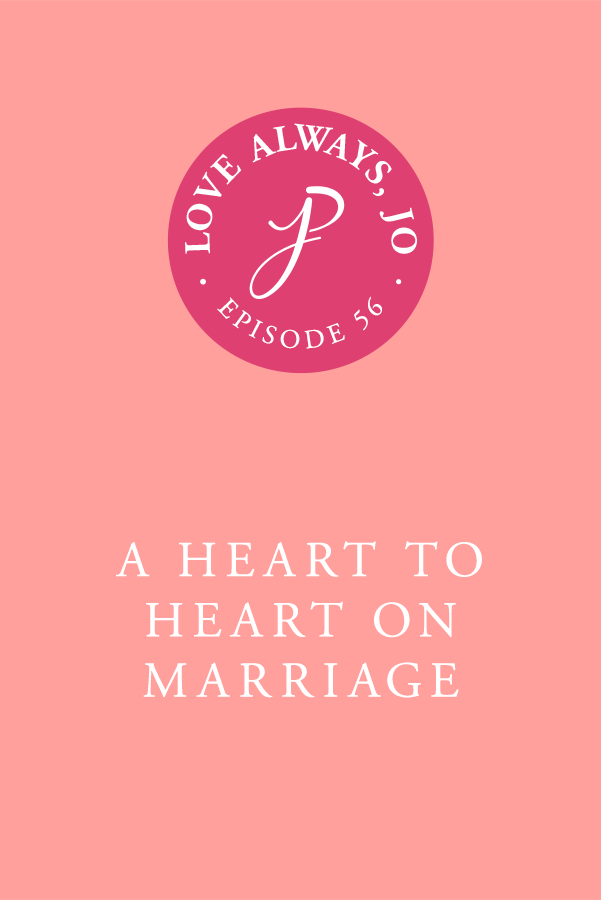
Podcast: Play in new window | Download

